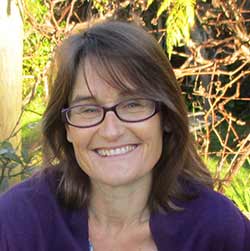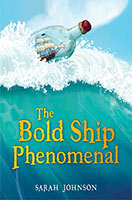 Name: Sarah Johnson
Name: Sarah Johnson
Place of birth: Hamilton, Waikato
Now living in: Whaingaroa Raglan, Waikato
What is your favourite food?
Salad. We have an enormous garden, full of bush, and a huge vegetable garden, full of weeds. I like to stroll around it in the evening, dodging mossies and searching for edible things. It’s like a treasure hunt, but for green, not gold.
Do you have a nickname and if so what is it?
No, unfortunately, although when I was at school I got called Nana Mouskouri after a singer who was popular in the 1960s, and had long straight brown hair, like mine.
What was your most embarrassing moment?
Much, much too embarrassing to mention here (or anywhere else for that matter).
How do you relax?
I love to walk. Anywhere, anytime. I like to be out in the world, seeing what is going on. I am lucky to live in Raglan, which has an abundance of harbour coastline and surf beach to walk along, as well as lots of hills to climb and look out from. Most days, I walk the tideline. It is my favourite place to think, and where most of my stories come from.
Who inspired you when you were little?
Stories and books of course, then when I was a bit older Jane Austen. Reading her books I understood for the first time how words, and the way they are put together to form story, can be perfect. When I was younger I wanted to be like the Russian gymnast, Nadia Comaneci. I practised, and practised, but the closest I ever got was a backwards walk-over. I would still love to be able to do the splits.
What were you like at school?
Studious. I kept my head down, and shuffled a lot. People kept telling me I was a dreamer, and it wasn’t until I became a writer that I realised that was a good thing!
What was your favourite/most hated subject at school?
I always loved maths. It was so logical, and so beautiful in being that way. I realise not everyone views it so fondly, but I have always found it deeply satisfying that 2 + 2 = 4. That type of certainty keeps the world on course.
I was never good a French (or any other language). It’s a shame, as French people can be very classy and I think I would look good in a beret, but my brain refused to cooperate.
What was the book you most loved as a child?
The Ladybird version of The Elves and the Shoemaker. The pictures entranced me, and I longed for the little men in ragged clothes to appear and make me some beautiful shoes (glossy pink ones, like in the book). I still have my copy (published in 1966), although the binding is broken. Recently I bought a new copy, so my children can enjoy it too, and I am pleased to say it is exactly the same!
Which person from the past would you most like to meet?
Virginia Woolf. I admire people, especially women, who have fierce and extraordinary intelligence. I think it takes a special brand of courage to have, and use, a mind like that.
Who is your favourite author/children’s author?
Am I allowed two? For children’s authors, Kate De Goldi is a long-time favourite. I love her use of language, and the unique lens through which she sees and tells her tales. I also enjoy the risks she takes with stories – their format, topic and scope. You can tell that she is not going to let anyone else tell her what, or how, she should write. I have also recently discovered Geraldine McCaughrean – whoa, what fabulous stories. So much detail and texture and richness. Now I am busy reading my way through all of her books I can find. Apparently she’s written over 160, so I’m going to be busy. For adults, my favourite author is the French writer Collette. She has been my firm favourite since I was in my early twenties, and I suspect she always will be.
Why did you want to be a writer?
The words. It has always been the words. I love them, and their music, and how they string together to form phrases. And I absolutely love the thrill of an unopened book. The anticipation of the story: where it will take me and what I will learn. Nothing beats it!
Do you have a special place where you write your books?
Not really. I work as a freelance writer, so I am lucky enough to have an office. But a lot of my writing happens other places too. When I’m walking, or cycling, or driving the car. Any place my mind can slip into story-making territory. Then I have to stop what I’m doing and write it down.
What’s the best thing and worst thing about being a writer?
The best is crafting stories, and working and reworking the words until they hum.
The hardest is probably when no-one (other than your Mum) wants to read those stories, but rejections are a well-known part of a writer’s life, so there’s no point getting hung up on it. Besides, I find that words are seldom lost. If they don’t get used in one place, they re-emerge in another.
If you weren’t a writer, what would you like to be?
A French-speaking Olympic gymnast, or failing that, a yoga teacher.
What advice would you give to aspiring writers or illustrators?
Think and write big, especially for children. Children’s minds are amazing – clever, imaginative and intuitive to a degree that adults can only envy. There are enough ho-hum books on the shelves. Work hard and produce something extraordinary.
- Read books by Sarah Johnson
- Visit Sarah Johnson's website
- Like Sarah Johnson on Facebook
This interview is from 2016.


